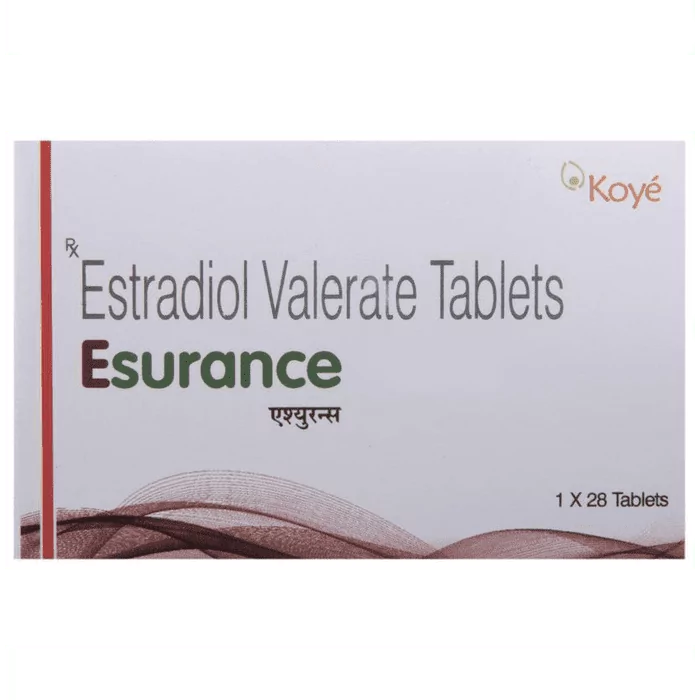Estradiol is a form of the hormone Estrogen, which is a significant sex hormone in females.
It has several functions, from reproductive health to building one’s bone density and immune system.
Since it has several functions, it is often natural to get confused about its primary role in one’s body.
So, this factor often raises the question among both men and women, “What does Estradiol do?”
We will discuss the most important functions of Estradiol in one’s body in detail.
What Does Estradiol Do
The work of Estradiol is usually observed in several aspects of one’s body, from physical to psychological.
Estradiol helps regulate reproduction in women and can maintain bone health and metabolism.
It is also important in maintaining cardiovascular health, brain function, and mood.
This section will thoroughly discuss the above-mentioned functions of Estradiol.
Save up to 90% on your medicine bills

Progynova 2 mg

Oestrogel 2.5 gm / 1.5 mg

Estrabet 2 Tablet

Esurance Tablet
Regulation of Reproduction
 Source: Demkat
Source: DemkatEstradiol plays a major role in regulating reproductive processes in both females and males.
According to research, Estrogen (Estradiol) is responsible for follicular development and proper ovulation in women.
Maintaining proper ovulation makes natural pregnancy an easier process in women.
Estradiol levels usually fluctuate throughout one’s menstrual cycle and prepare the uterus lining for the implantation of eggs.
Additionally, Estradiol medications are a popular choice of doctors to treat Menopause symptoms in women.
Another study states that Estradiol is also responsible for the development of secondary sexual properties in women.
These characteristics include the growth of reproductive organs and fat distribution to hips and breasts.
Bone Health and Metabolism
One of the main functions of Estradiol is to maintain bone health and metabolism in an individual.
It helps in the growth and maturation of bones both during youth and adulthood.
Estradiol helps to stop bone resorption by Osteoclasts, the cells that break down bone tissue.
Thus, proper Estradiol dosage is beneficial in preventing Osteoporosis (thinning bones) in individuals.
Estradiol is also responsible for improving Insulin production and lowering body fat.
It maintains one’s lipid metabolism and also has antioxidant properties in the body.
Cardiovascular Health
 Source: pixelshot
Source: pixelshotEstradiol plays a significant role in cardiovascular health, particularly in premenopausal women.
Premenopausal women usually have a low risk of cardiovascular health problems since Estrogen can maintain one’s cardiovascular health.
It helps maintain the elasticity of blood vessels and improves healthy blood flow.
This also reduces the risk of Hypertension or high blood pressure in individuals.
Brain Function and Mood
Estradiol can influence different aspects of one’s brain function and mood.
This hormone is responsible for maintaining the function of the neurons, which are important for learning and memory.
Additionally, changes in Estradiol levels can cause mood swings in different individuals.
Low Estrogen can often result in low Serotonin (happiness hormone) levels, leading to Depression and Anxiety during Menopause.
It can also cause irritability, anger, or sudden sadness during menstrual cycles.
Conclusion
The answer to the question, “What does Estradiol do?” is quite detailed and vast.
Estradiol is highly responsible for maintaining the proper functioning of female reproductive organs and the proper implantation of the egg.
It also plays an important role in developing secondary sexual characteristics in women.
Estradiol maintains bone density and overall lipid metabolism in one’s body, improving one’s bone health and body mass.
Additionally, proper Estradiol levels can also prevent the prevalence of cardiovascular diseases.
This hormone also maintains the brain function related to memory and learning and regulates moods.
It is always best to consult an expert if a person is facing any symptoms of low Estradiol.

Frequently Asked Questions
What does Estradiol do in IVF?
Estradiol in IVF (In Vitro Fertilization) is essential in preparing the uterine lining for embryo implantation.
Doctors often administer it as part of the IVF protocol because it helps synchronize follicle development, which increases the chances of a successful natural pregnancy.
Does Estradiol play an important role in the body’s immune function?
Yes, Estradiol plays a significant role in maintaining the body’s immune function. It affects immune cell activity, cytokine (a protein made by immunity cells) production, and inflammation levels.
Estradiol’s influence is also important in autoimmune diseases, where fluctuations in Estrogen levels can affect the severity and progression of the condition.
What are the symptoms of low Estradiol levels?
Symptoms of low Estradiol levels in women include irregular menstrual cycles, hot flashes, vaginal dryness, low libido, mood swings, fatigue, and difficulty concentrating.
In men, low Estradiol levels may cause Erectile Dysfunction, low sex drive, fatigue, and loss of muscle mass.
What does Estradiol do to the male body?
Estradiol plays several essential roles in the male body. These include maintaining bone density, regulating libido, and erectile function.
It is also responsible for supporting cardiovascular health and regulating mood. Estradiol also contributes to sperm production and maturation and influences fat distribution in the body.
What does Estradiol do during sexual differentiation?
During sexual differentiation, Estradiol, a type of Estrogen, contributes to the developing of primary and secondary sexual characteristics in both males and females.
In females, it promotes the development of reproductive organs and secondary sexual characteristics. In males, Estradiol plays a role in brain development and behavior.
Cheap Medicine Shop only refers to credible, authoritative sources for our content. If you’re curious about how we ensure the integrity of our content, we encourage you to read our Content Information Policy.














